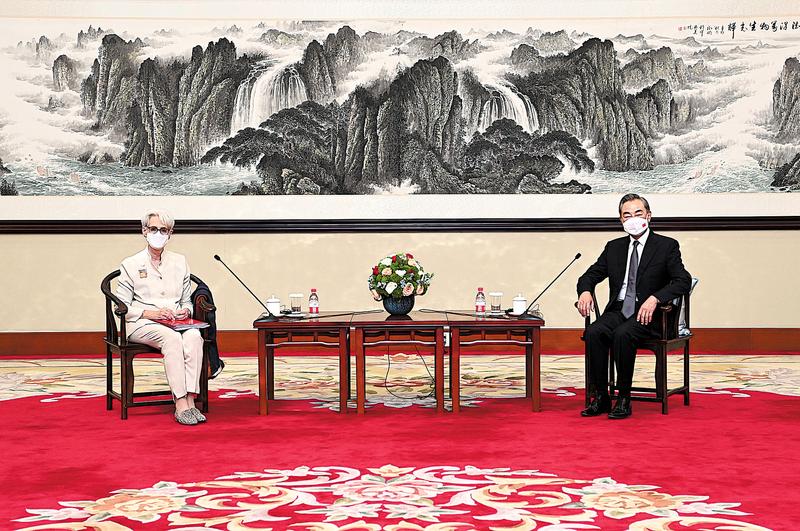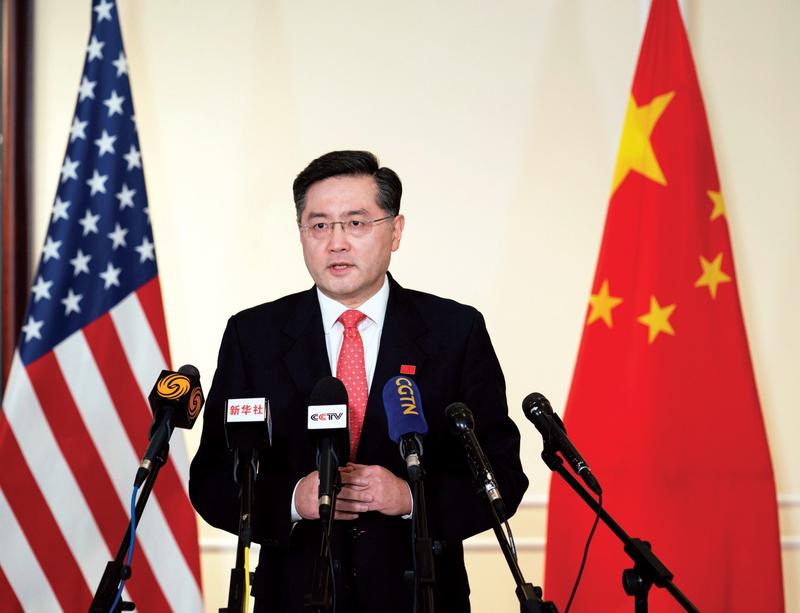 State Councilor and Foreign Minister Wang Yi meets with US Deputy Secretary of State Wendy Sherman in Tianjin on July 26. Wang urged the United States to drop its arrogance and prejudice and return to a rational and pragmatic China policy. (LI RAN / XINHUA)
State Councilor and Foreign Minister Wang Yi meets with US Deputy Secretary of State Wendy Sherman in Tianjin on July 26. Wang urged the United States to drop its arrogance and prejudice and return to a rational and pragmatic China policy. (LI RAN / XINHUA)
Having putting forward two to-do lists to the United States during diplomatic talks in Tianjin, China is hoping for some positive changes in the world’s most important bilateral relationship, with a new ambassador in Washington expected to play a key role in taking discussions forward.
The two lists were raised by Vice-Foreign Minister Xie Feng during his meeting with US Deputy Secretary of State Wendy Sherman, who visited Tianjin in North China from July 25 to 26.
State Councilor and Foreign Minister Wang Yi, at his separate meeting with Sherman, warned Washington not to cross the line in three areas — China’s political system, development and sovereignty.
Beijing has drawn lines for managing bilateral divergence to prevent it from spiraling out of control, and the ball is now in Washington’s court to respond with goodwill, experts said. And Washington is urged to adopt a proper approach toward China-US cooperation, as it is untenable to see the US damaging Chinese interests while also seeking collaboration.
Speaking to reporters after his meeting with Sherman, Xie said that one of the lists put forward deals with “US wrongdoings that must stop”, while the other is a list of “key individual cases that China has concerns with”.
In the first list, China urged the US to unconditionally revoke visa restrictions on Communist Party of China members and their families, revoke sanctions on Chinese leaders, officials and government agencies, and remove visa restrictions on Chinese students.
The second list stated some concerns including Chinese diplomatic and consular missions being harassed and attacked in the US, growing anti-Asian and anti-China sentiment, and Chinese citizens suffering violent attacks.
The two lists proposed to Washington “have pointed out the right direction for the US to get back on the right track”, said Diao Daming, an associate professor of US studies at the School of International Studies of Renmin University of China.
“If Washington really takes heed of what Beijing has said and is ready to rectify its wrong approach and put the ties back on track, it should take more actions ...” he said.
At the discussion with Sherman that lasted more than four hours, Xie criticized the concept of China as an “imagined enemy”, attempts to bring China down, and comments defining ties with China as “competitive, collaborative and adversarial”.
According to a Foreign Ministry statement issued about the talks, Xie said the Chinese people “feel that the real emphasis is on the adversarial aspect, the collaborative aspect is just an expediency, and the competitive aspect is a narrative trap”.
Demanding cooperation when Washington wants something from China seems to be US policy, as well as decoupling, cutting off supplies, blockading or sanctioning China when it believes it has an advantage; and resorting to conflict and confrontation at all costs, he said.
It seems that the US only thinks about addressing its own concerns, getting the results it wants and advancing its own interests, said Xie.
He urged the US to change course, work with China on the basis of mutual respect, and embrace fair competition and peaceful coexistence with China.
 Qin Gang, China’s ambassador to the US. (PHOTO PROVIDED TO CHINA DAILY)
Qin Gang, China’s ambassador to the US. (PHOTO PROVIDED TO CHINA DAILY)
Foreign Minister Wang also told his guest that the US treats China as a competitor and rival, and it attempts to interrupt China’s modernization process.
Beijing believes that dialogue will help chart a path for the two countries’ peaceful coexistence, and that their win-win interactions will benefit the world as well.
Washington is expected to “break away from pride and prejudice”, stop lecturing and return to a reasonable policy approach toward China, Wang said.
Sherman said the US-China relationship is the most important bilateral relationship in the world, and she reiterated that the US adheres to the one-China policy and does not support “Taiwan independence”.
Wang told Sherman that the US must not seek to obstruct or even break China’s development process, and it must not infringe upon China’s national sovereignty, let alone undermine China’s territorial integrity.
Allegations related to Xinjiang, Tibet and Hong Kong have nothing to do with human rights and democracy, but separatism instead, Wang said.
Sherman said that the US has no intention of curbing China’s development and does not want to contain China, and that it is good to see China achieve development.
The two sides can carry out benign competition, cooperate in dealing with climate change, drug control and international hot spot issues, enhance their abilities in crisis management and control, and avoid conflicts, she added.
Sherman mentioned the concept of “rule-based international order”, a phrase US diplomats have frequently used recently.
Wang responded by telling her that “the US should be the country that should reflect most in terms of abiding by international rules”.
The high tariffs imposed by the US on China are a violation of World Trade Organization rules, Wang said.
Xu Yicong, a researcher at the China Foundation for International Studies and a former Chinese ambassador to Cuba, said, “The visit and comments made by both sides show that policymakers in both China and the US are well aware of the relationship’s importance and the need to work together to maintain necessary and close communication.”
China’s new ambassador to the US, Qin Gang, said on July 28 that he believes “the door of China-U.S. relations, which is already open, cannot be closed.”
“This is the trend of the world, the call of the times, and the will of the people,” Qin told the media upon arrival in the US.
Fifty years ago, Henry Kissinger made a secret visit to China and opened the door to the normalization of China-US relations, Qin noted.
“It was during the Cold War; at that time there was virtually no contact between the two countries. Dr Kissinger had to travel covertly to China via a third country.”
“Fifty years later today, as the 11th Chinese Ambassador to the United States, I can travel most openly and fly directly to this country. How the world has changed with the passage of time,” Qin said.
Over the past half a century, the China-US relationship has kept moving forward despite twists and turns, Qin said.
“It has not only had a profound impact on the two countries, but has also changed the course of history and the world significantly. The world today is going through major changes unseen in a century,” he said.
Prior to his ambassadorship, Qin served as Chinese vice foreign minister. His predecessor, Ambassador Cui Tiankai, completed his tenure and returned to China on June 23.
Wu Xinbo, dean of the Institute of International Studies at Fudan University, said: “A competition in a neutral sense is to win the game by constantly improving oneself. But the ‘competition’ by the US is not by improving itself but by suppressing China.”
Although some in Washington have claimed that US engagement with China has failed, the US “still looks to carry out substantial, constructive contacts and dialogue with China, like the talks in Tianjin. Its mindset could be defined in one word: paradoxical,” Wu added.
However, given the latest China-US trade figures, fueled by voracious consumer demand, it would be hard to tell the two countries have been in a trade standoff for over three years.
“We said during the trade war the global economy would continue to grow and prosper, and it has. China was, and remains, our largest trading partner, accounting for about 60 percent of containerized imports and 30 percent of exports in 2020,” Noel Hacegaba, deputy executive director of the Port of Long Beach in Southern California said.
According to US Census Bureau data for May, the latest figures available, trade with China was responsible for 13.9 percent of all US trade, after Mexico (14.7 percent) and Canada (14.5 percent).
The United States imported US$189.7 billion worth of goods from China — the most imports from any country — while China took in US$59 billion worth of US goods, as its agricultural purchases have increased.
The White House has been conducting a review, now in its seventh month, of the economic ties between the two countries, including the 2020 phase-one trade deal.
Gary Hufbauer, a senior fellow at the Peterson Institute of International Economics in Washington, said Treasury Secretary Janet Yellen and US Trade Representative Katherine Tai should seek to return US-China trade to normal “most favored nation” status over the next year or so.
Robbin Goodman, director of business programs and corporate affairs at the Dallas-based George H.W. Bush Foundation for US-China Relations, said: “While it is true the trade deal is fraught with unrealistic commitments that do little to address the fundamental problems undergirding US-China relations today, certain commitments, such as those around agricultural regulations, have produced meaningful results in terms of harmonizing US and Chinese standards.
“These small victories are worth preserving,” he said, adding it is “imperative” that the Biden administration repeal the “nonsensical tariffs that remain in place today”.
Xinhua and Liu Yinmeng in Los Angeles contributed to this story.
Contact the writers at zhangyunbi@chinadaily.com.cn


